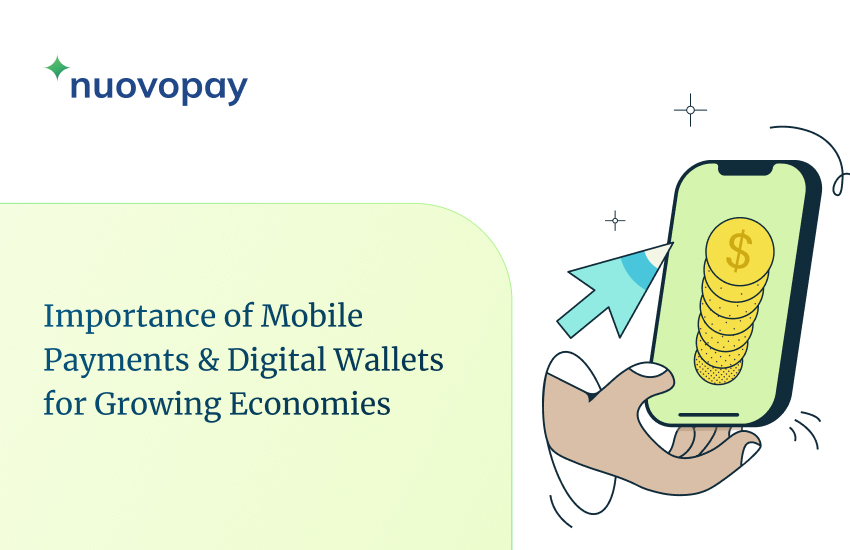Mobile technology has made on-the-go payments easy and popular in most of the world. The convenience of not carrying a lot of cash or cards every time you step out of the house is appealing. On the business side, store owners are able to process sales faster than ever and reduce transaction fees by using mobile payment platforms that offer lower costs compared to traditional credit card processing systems.

The increasing adoption of mobile payment technology in developed economies results from the simplified business processes it enables. In developing nations, mobile payments have advantages beyond mere money transfers. The spillover benefits can aid the growth of the business ecosystem, finance, infrastructure, and more. Before exploring this domain, let us first understand what mobile payments are and how they are enabled via digital wallets.
What are Mobile Payments and Digital Wallets?
As the name suggests, mobile payments are simply financial transactions and payments made using mobile devices. When individuals transfer money in exchange for a product or service from their smartphones or tablets, they make a mobile payment. Other examples of mobile payments include paying for public transportation fares, purchasing items online through mobile apps, using digital wallets at retail stores, transferring money to friends or family through mobile banking apps, etc.
A digital wallet is the software or interface that facilitates these mobile payments. It typically stores people’s bank, credit card, or other information and enables them to make payments conveniently through an app on their device. Digital wallets use a mobile device’s wireless capabilities like Bluetooth, WiFi, and magnetic signals to transmit payment data securely from the device to the point of sale (POS) designed to read the data and connect via these signals.
Importance of Mobile Payment and Digital Wallet Services for Developing economies
Convenient Access to Financial Services
Mobile payments provide a simple way for individuals and businesses to access complex financial services. They ease activities such as paying EMIs, credit collection, making vendor payments, etc., in places that do not have suitable financial institutions.
Digital wallets bypass the need for physical bank branches or ATMs, making financial services accessible even in remote areas. This accessibility can empower underserved populations, including rural communities and low-income individuals, by providing them with a tool for secure and convenient financial transactions.
Boost Economic Growth
Mobile payments and digital wallets help break the financial barriers to starting a business. By using personal devices to collect payments, business owners can avoid costly investments in traditional POS systems. They promote the establishment of e-commerce businesses by enabling online payments.
Individuals can easily make purchases from remote locations and buy from businesses in different regions, thanks to the convenience of online payments. Overall, mobile payments and digital wallets speed up the flow of funds and make it easier for people to participate in the economy.
Fast and Transparent Transactions
The use of on-the-go payments eliminates the delays and risks stemming from lengthy payment processes such as depositing cheques and withdrawing large amounts of cash. The fast speed of mobile payments helps quickly verify if money is securely received by the right person. Digital wallets help track financial transactions to prevent unauthorized transfers and money receipts.
In emerging economies, where resources are somewhat scarce, fast payments and quick access to funds enable business owners to reinvest those funds in the business to grow it.
Cost Savings
As mobile payment platforms are largely automated and cloud-based, they charge lesser transaction fees than traditional banks and financial institutions. They are cheaper than bank transfers or money orders, proving to be apt for emerging businesses.
Challenges Developing Economies Face in Adoption of Mobile Payments and Digital Wallets
Despite the wide-ranging benefits of mobile payments and their potential to promote economic growth and financial inclusion, they are not widely used in developing economies.
Inaccessibility to mobile devices is the foremost challenge in emerging nations. A digital divide exists wherein a significant portion of the population is unable to use or afford smartphones and tablets. The high upfront costs of devices prevent people and businesses from using mobile devices. Many people prioritize spending on necessities over mobile devices or internet access, which are essential for using mobile payment systems.
Flexible pricing plans that can make devices affordable for these people are unavailable in developing regions. Addressing this requires collaborative efforts between governments, technology providers, and financial institutions to develop financing models tailored to the needs and constraints of low-income populations.
Many rural and remote areas also lack reliable network connectivity, making it difficult for individuals to access mobile payment services consistently. This digital infrastructure gap limits the usage of mobile payments and hampers the overall financial inclusion of the population. It results in a lack of awareness about the easy use and benefits of mobile payments in large sections of the economy. Concerns about the security of mobile payments and digital wallets also become common. Those who have access to the necessary technology may be reluctant to use mobile payments due to fears of fraud and loss of funds.
Device Financing Risk Management (DFRM) Platforms: The Way Ahead
Addressing the above challenges is crucial for the development of emerging economies. The advantages of mobile payment technologies can enable businesses and individuals to participate more actively in the economy. They can facilitate seamless transactions, reduce costs associated with cash handling, and expand access to modern financial services.
Device financing can play a pivotal role in improving accessibility to mobile devices and, in turn, promote the use of mobile payments and digital wallets. Telecom carriers and financial institutions can loan devices to people who cannot afford their upfront costs. In exchange, the purchaser can pay the cost of the device in monthly installments over a fixed period to reduce his or her burden of the large initial investment.
However, the apprehensions of telecom carriers and financial institutions regarding the repayment ability of the recipients of financed devices remain a major challenge for the entry of device financing models.
A device financing risk management (DFRM) platform such as NuovoPay can help mitigate these concerns. NuovoPay enables financiers to eliminate risks associated with EMI defaults. Its remote locking feature can be used to restrict access to device applications in a staged manner in case of payment failure. DFRM tools like NuovoPay build trust among telecom carriers and financial institutions, ultimately driving greater financial inclusion and economic participation in emerging markets.
Drive Digital Inclusion with NuovoPay
Mobile payments and digital wallets can be instrumental in the economic growth of developing economies. However, achieving the same level of adoption in these regions as in developed economies requires addressing several key challenges. DFRM platforms can enhance the accessibility and affordability of smartphones and mobile payments among the population.
With the right tools in hand, emerging economies can leverage technology to rapidly advance their economies, improve financial inclusion, and open new avenues for businesses.
Explore How NuovoPay Works in a Quick Product Walkthrough with our Expert – Book a Demo





